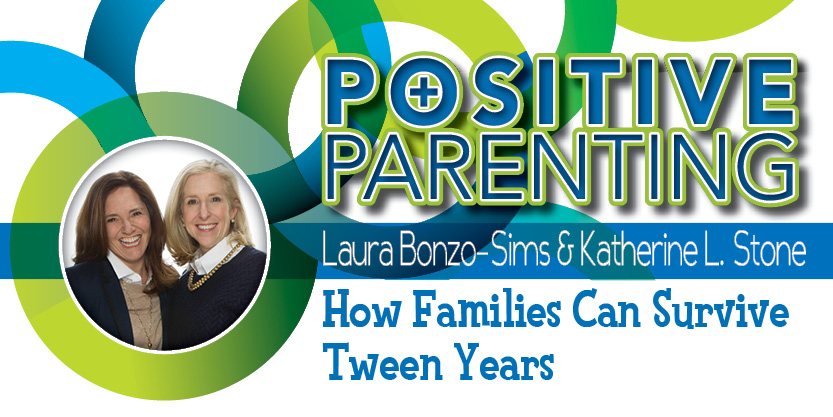Positive Parenting: How Families Can Survive Tween Years
By: Laura Bonzo-Sims & Katherine L. Stone
It was the best three years of my life,” said no one ever!
For many people, middle school is not a rite of passage, but something that is simply endured. What makes it so hard? What are today’s issues? And what can parents do to help?
Developmentally, ages 12 to 14 is a period when the influence and opinion of peers increase in importance.
Also, because of hormonal changes, kids of this age exhibit strong emotions that fluctuate. They can “love” their best friend or “be so over her” all in one day.
Today’s tweens face the same challenges of tweens from the 1980s and 1990s such as first crushes, cliques, competition with sports or arts increases.
Also, parents get more irritable with their tweens who are not quite as snuggly and sweet as their once beloved babies and toddlers.
Add all of those to today’s potential for 24/7 connection with peers, social media with photos of who’s at the sleepover and who’s not, and access to information that is not developmentally appropriate.
So, what can we do to help our kids weather the storm of the tween years?
– Encouraging kids to have peer groups outside of their school will help them ride the tide of being excluded because they have other friends to turn to.
– Spending time with people of varying ages decreases kids getting stuck in the bubble of listening mainly to the opinions of their cohorts.
– Volunteering provides youth with the opportunity to focus on people other than themselves.
– When parents listen with an open, non-judgmental ear, it allows youth to open up more, thus allowing parents to subtly guide.
– Understanding the concept of “temporary” will help your child tolerate the distress of peer conflict.
– Modeling and discussing others’ points of view can lead to more empathetic kids.
– Talking with your tween about social cliques and whether they’re really set or kids can move in and out. This can lead to a child who is more accepting of other kids and not as judgmental.
– Avoiding parental gossip about other kids is paramount. Kids aren’t the only ones guilty of keeping social conflict stirred up.
– Allowing kids to work things out independently is good when appropriate.
Katherine L. Stone, Ph.D. is a licensed psychologist who has practiced in Lexington for almost 20 years, focusing on mental health issues that affect today’s youth and young adults.
Laura Bonzo-Sims, Ed.D. has been an educator for 25 years, working with students in middle school, high school and graduate school.

